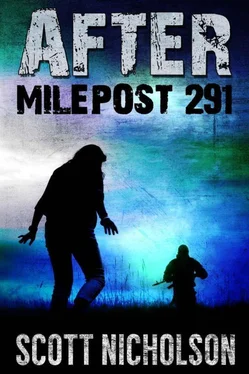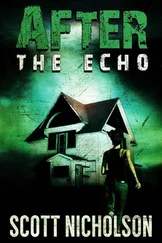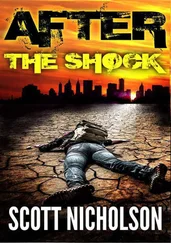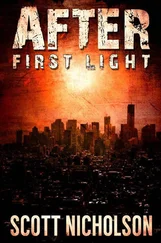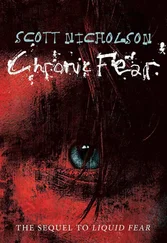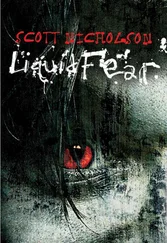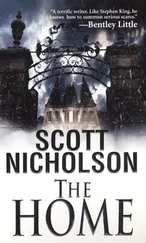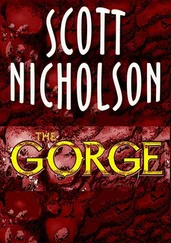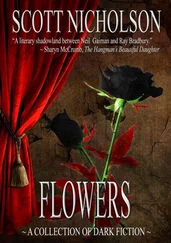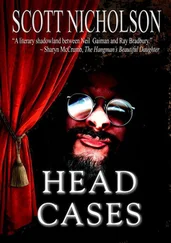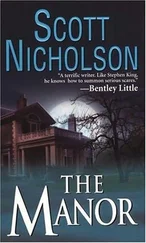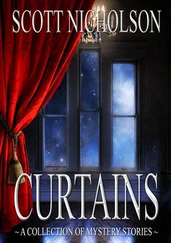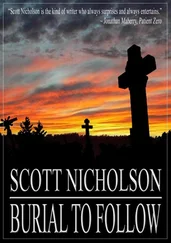But something about the boy tugged at her…a memory of him running toward her in that same fashion, only waving a sheaf of colorful papers in the air rather than his hand.
“Rachel, it’s me!” he said.
The word came to her, interrupting the echolalia of her own name: Stephen.
She didn’t know what the new word meant, but she involuntarily moved toward him, the sun stinging her eyes, the beacon signal fading.
Then the boy was close enough that she could see his face, round and red-cheeked, with dark brown, uneven bangs and a missing tooth. “Stephen?”
“Careful,” the man with her said, but Stephen didn’t hesitate. He scrambled through the fence onto the road and hugged her so hard she almost fell over.
After a moment, she returned the hug. His smell was familiar, and her serenity returned, but it was different than before, less focused and more resplendent with the smell of the river and the grass and the air and herds of clouds sliding across the blue curves of the sky’s high domed cathedral.
“You’re alive!” Stephen said, his arms tight around her waist.
“Yes…” She wasn’t sure what that meant, but she had no desire to repeat it. Her heart swelled with an unidentifiable warmth that frightened her at first, but she surrendered it into the serenity offered by her other senses.
“She’s…a little sick,” said the man, and now Rachel remembered. He was Campbell. She didn’t remember everything, not clearly, but she understood they had been together. Same as she had been with Stephen.
“DeVontay’s here,” Stephen said. Then he peered at her. “Your eyes. They look weird.”
“I’m okay,” she said, a phrase lodged in her head. She did feel okay, although her head ached a little and her legs were sore from walking.
Then she saw the man coming across the pasture, leading two horses by leather loops. He was dark-skinned, dressed in a familiar denim jacket, his black leather boots shiny from the dew. His eyes looked weird, too—at least, one of them did.
DeVontay put his foot against one of the fence posts and gave it a couple of kicks, and then pushed until it leaned to the ground. He led the horses over the wire, and they gracefully jumped until they stood in the weeds alongside the ditch, watching with curiosity and perhaps amusement.
“DeVontay,” she whispered.
“Rachel,” he said, as wary of her as she was of him. DeVontay looked at Campbell, who said something she couldn’t understand.
“You’re the guy from Taylorsville,” DeVontay said to him.
“She’s gone through some changes,” Campbell said.
“She’s sick, but she’s okay,” Stephen said with evident happiness. “She’s not a Zaphead.”
“What’s a Zaphead?” she asked.
“ That’s a Zaphead,” DeVontay said, pointing up the road.
Rachel turned and saw a small group of figures, still distant but obviously coming their way. She was struck by a desire to run toward them, but DeVontay’s voice pulled her away and broke the signal.
“We’d better get out of here,” he said. “Do you know how to ride?”
DeVontay helped Rachel astride the horse, holding the reins as she struggled to keep her balance as the animal swayed. Campbell started to climb up after her, but DeVontay said, “I’ll hold her. You take care of the boy.”
Rachel had ridden before, but she had no distinct memory of it. She gripped the animal’s flanks with her legs as best she could. DeVontay launched himself up onto the horse in front of her, and she had to wrap her arms around him to keep from toppling off. The shape of his body and his smell were familiar and comforting in a way that words couldn’t describe.
I’m Rachel. Why does it seem so new?
When Stephen and Campbell were likewise mounted, DeVontay guided their horse until its hooves clopped on the asphalt. They headed upriver, the jostling of the beast tossing them gently against each other. DeVontay wheeled the horse after a minute, and Rachel saw the group of figures had grown smaller against the horizon.
Then they turned once again toward the great gray ridges with slopes that burned with autumn colors gone to rust that hid the bones of winter beneath them.
“Where are we going?” she asked DeVontay.
He turned halfway so that his good eye was studying her. “Milepost 291. You ever heard of it?”
“No, but I can’t think of anywhere else to be.”
“Your eyes…they…”
He didn’t finish. He faced forward, gripped the reins, and urged the horse onward, Stephen and Campbell in their wake.
Rachel looked up at the sky. Thank you, God.
She didn’t know what those words meant, either, but they seemed old and familiar. That other signal, the high, brittle keening of a single purpose, faded altogether as they rounded a bend and passed lifeless cars and houses, and she soon forgot it.
Franklin’s knees were aching by the time the first gray hint of dawn teased the eastern sky. The moist air had soaked his clothes, but he was determined to push on. The trail had widened, with occasional wooden signs describing plant species and more landscaping features that suggested formal park development. When he saw the mossy picnic table, a surge of joy pushed through the tired chambers of his heart.
The terrain leveled somewhat, and he soon came to a restored cabin, the kind the park service had preserved in an attempt to show tourists the hardscrabble life of European settlers, although in truth their days had been less hectic than those of salaried corporate commuters of the late, great Twenty-First Century. The cabin was unlocked and abandoned, and even though the wide gaps in the logs seemed to draft colder air inside than out and the dirt floor was no softer than the forest carpet, he rested for a spell, knowing he’d soon arrive at the roadway.
Franklin reached the pavement just before dawn, a familiar stretch that bore abandoned cars with license plates hailing from many different states. Death had recognized neither boundaries nor luxury class, as a primer-spotted Ford Fiesta shared the automotive graveyard with a Mercedes, the occupants of both sharing the same speed of decomposition.
He took a risk by walking the parkway—he was much more exposed to Sarge’s patrols, since the road was easily viewed from the surrounding ridges—but now he was eager to finish his journey.
He came to Milepost 288 and rested again. For the final three miles, he stayed in the high weeds along the road, even though the grass was thick with dew. The sun was well up by the time he reached the concrete marker at Milepost 291 and looked up the mountain where Wheelerville was hidden among the trees and boulders.
He took the logging road that wound to the peak. Even though he’d cut several footpaths that were hardly noticeable to the casual hiker, he decided to stick with the relatively easier route he’d used to haul supplies and materials to his compound. Aside from the occasional beer can, there was no sign that civilization had ever touched this rocky series of switchbacks and rhododendron thickets. The air was rich with decaying leaves, muddy springs that smelled of salamanders, and the heavy sweetness of goldenrod and snakeroot.
If anyone had passed this way in the two weeks since he and Jorge had been away, there was no sign of their passage in the loam and black dirt. He moved quietly, like an animal, alert for both soldiers and Zapheads. He didn’t think Sarge would have spared the resources necessary to locate the compound, but Franklin would never sleep fully as long as they remained regional neighbors. On the other hand, any Zapheads would be more likely to encounter the bunker and its noisy occupants than Franklin’s hideaway.
Читать дальше
